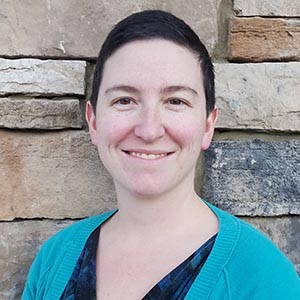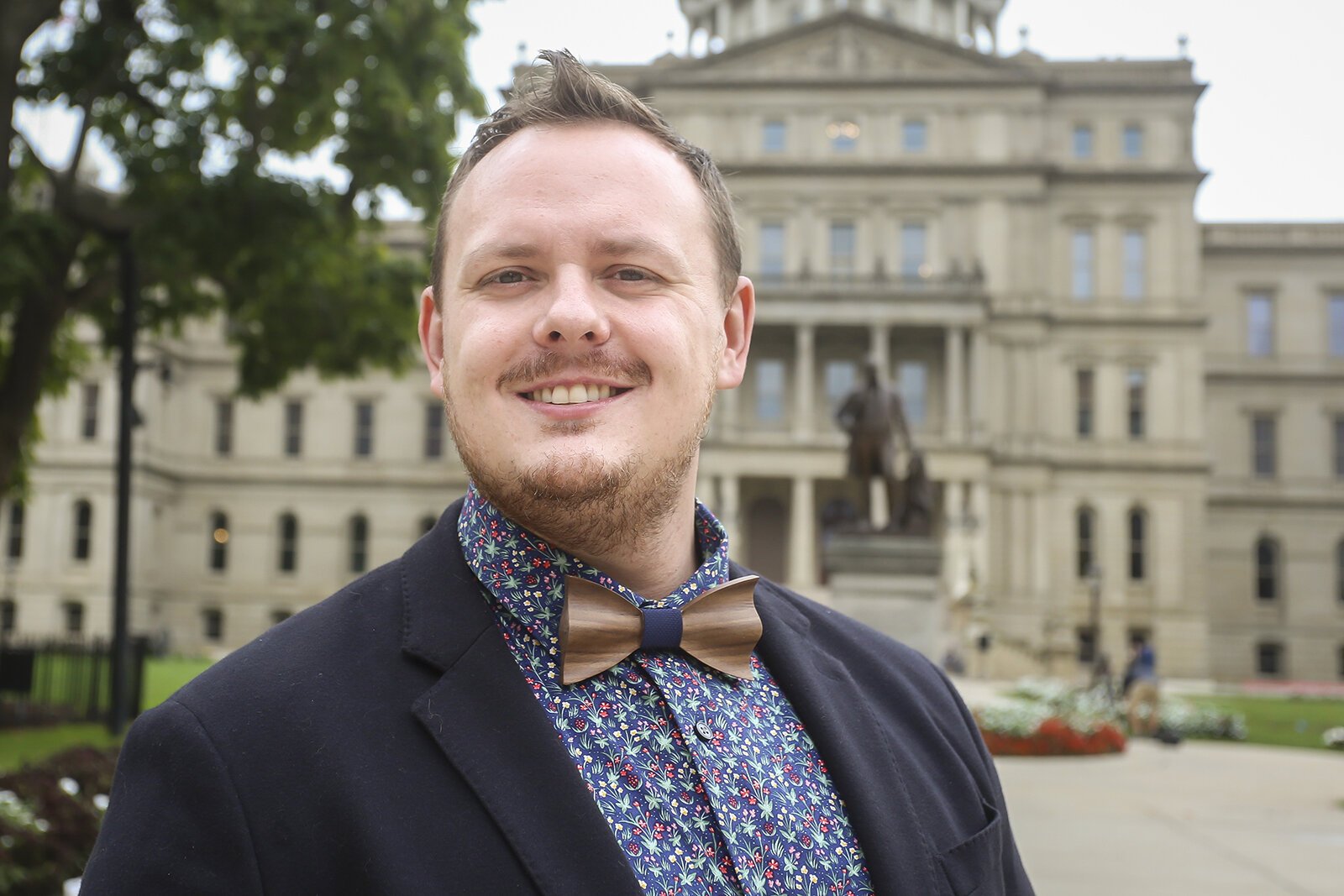MSU Social Work PhD student leads advocacy for Social Work Licensure Reform
September 6, 2024 - Brandon Drain
In November 2021, the Association of Social Work Boards (ASWB) made a unanimous decision to compile and report disaggregated pass rate data for its ASWB Exam.
The data revealed that between 2011 and 2021, white test takers in Michigan had a 73.7% first-time pass rate, compared to 28.2% for Black test takers and 52.8% for Hispanic/Latino test takers. The eventual pass rates showed similar disparities, with white test takers achieving an 89.2% pass rate and Black test takers a 51.1% pass rate, with other racial/ethnic groups falling in between.
Age was another category showing discrepancies in pass rates. Test takers aged 18 to 29 had a 71.7% first-time pass rate and an 89.8% eventual pass rate, while those aged 50 and older had a first-time pass rate of 51.5% and an eventual pass rate of 63.2%.
The disparities within the data gave insight into a potentially large and obvious problem: The ASWB Exam is inherently biased, according to experts.
 Jen Hirsch, a Ph.D. student at Michigan State University’s School of Social Work and LMSW-Clinical, along with her colleagues, responded to this call to action by conducting a social and racial equity policy analysis of alternatives to the ASWB Exam.
Jen Hirsch, a Ph.D. student at Michigan State University’s School of Social Work and LMSW-Clinical, along with her colleagues, responded to this call to action by conducting a social and racial equity policy analysis of alternatives to the ASWB Exam.
“We trudged through all the literature about past stuff, oral exams, simulations, jurisprudence exams -- all of it,” said Hirsch. The result was a peer-reviewed, policy analysis paper that explored various, ethically-based alternatives to the ASWB Exam. The paper’s conclusion yielded that jurisprudence exams and provisional licensures have the best possibility of being equitable pathways to licensure.
Jurisprudence exams are generally open book and focus on state-specific laws and regulations that social workers need to follow daily. Several professions in Michigan, including physical therapists, podiatrists, optometrists, and occupational therapists, already require jurisprudence exams for licensure.
“We need a jurisprudence exam, not a competency-based exam,” said Hirsch. “People need to know the laws in their state. Everything else, the competency part, is already taken care of.” Before even getting to the first licensing step, social workers must complete accredited programs at schools of social work like MSU.
The addition of the jurisprudence exam is one of several proposed changes in the Licensure Modernization Act, HB 5184 and HB 5185. These bills also seek to eliminate the ASWB exam as a requirement for all tiers of licensing and reduce the required supervision hours for a clinical license from 4,000 to 3,000, aligning Michigan with other states. They also adjust the licensing tiers in Michigan to eliminate the limited-license type that has a capped number of renewals, which is rare among states. Instead, social workers would be LBSW, LMSW, or LCSW, as it is in many other states.
On June 13, 2024, Hirsch, along with various Michigan social workers, testified before the House Subcommittee for Behavioral Health Policy in support of the Social Work Licensure Modernization Act. A recurring theme spoken about during the testimony was the real-life impact failing the ASWB Exam has on the behavioral health provider workforce.
 “Nearly every day at my office at NASW, I get calls from current social workers or former social workers who've lost their jobs, their income and their careers due to the inability to remain licensed in Michigan,” said Duane Breijak, LMSW-Macro and Executive Director of NASW-Michigan. “These are not individuals who are unethical, that are not incompetent but have to leave social work because of barriers that exist within our current licensing process,” said Breijak.
“Nearly every day at my office at NASW, I get calls from current social workers or former social workers who've lost their jobs, their income and their careers due to the inability to remain licensed in Michigan,” said Duane Breijak, LMSW-Macro and Executive Director of NASW-Michigan. “These are not individuals who are unethical, that are not incompetent but have to leave social work because of barriers that exist within our current licensing process,” said Breijak.
Michigan, along with the rest of the nation, is facing a shortage of behavioral health providers, according to reports. Social workers are also the largest group of behavioral health providers in the nation, according to the Substance Abuse and Mental Health Service Administration. This shortage is exacerbated due to thousands of longstanding social workers needing to either leave the state of Michigan to continue their practice, or completely pivot their careers.
Many social workers in favor of The SWMA hold high hopes that if it’s passed, Michigan will not only see an increase in workforce numbers but an increase in the quality of care as well.
“The exam is gatekeeping,” said Hirsch. “Those numbers we get back by taking away that dam are educated, experienced social workers, and we need them.”
“We know that this legislation alone is not going to fix all the problems leading to our current workforce shortages,” said Breijak. “But it's a vital step to retain our current workforce and provide a long overdue path for individuals to come into the profession.”
MSU’s School of Social Work has also taken the initiative towards improving the workforce shortages.
In partnership with the Michigan Department of Health and Human Services, the Title IV–E Fellowship aims to recruit, retain and educate students to be leaders in the field of child welfare.
The $1.7 million dollar program offers students up to $20,000 over the course of four semesters. In return, they must commit to working four months in a high-need community, including tribal, rural and underserved populations. They can also work for the Michigan Department of Health and Human Services, as well as tribal or private agencies that specialize in foster care.
Despite the overwhelming uproar for the need to change Michigan’s current licensing process, there are still pundits on the fence.
Social work activists Grace L. Gates, LMSW, LCSW, and Suzanne L. Velazquez, Ph.D., LCSW, LMSW, at savesocialwork.org composed an article titled Protect Public Health and Safety in Michigan: Reject The Social Work Licensure Modernization Act. The article touches on several points on why the bills put the public at risk. “The Social Work Modernization Act is an impulsive and simplistic response to a complex issue and will result in dire consequences for Michiganders and social workers,” the authors wrote.
They also go on to argue that eliminating the exam wholly would devalue the practice overall stating, “In positions with such great responsibility, such as working with community mental health, the standards should be high.”
In addition, they argue that The SWMA would allow social workers to participate in various high-stakes tasks without demonstrating a minimum level of competency and knowledge. These tasks include working in psychotherapy, providing mental health diagnosis, assessing individuals at-risk of suicide or homicide, to name a few.
Hirsch argues that other aspects of licensure address these issues, identifying that competency should be based on what’s already in place prior to the exam: An accredited education, supervised hours, continuing education and workplace experience. They also state that it’s the disciplinary board’s job to protect the public from unethical social workers, and that, “You can be ‘competent’ and still practice unethically,” said Hirsch.
Instead, the issue Hirsch and other advocates focus on is that the format of the ASWB Exam isn’t fit to measure competency because it has “stripped away or made actually really invisible, the values that you want us to have,” said Hirsch. They state that the practice of social work is a values-based practice which is also patient centered.
Because the ASWB Exam is given to all social workers, it must decontextualize its material. Hirsch makes the distinction on how the patient-provider relationship changes depending on the context, with medical social workers having a different set of approaches vs a school social worker, and so on.
“The answers to the questions are often carceral, the answer that ASWB is often looking for is transactional,” said Hirsch. “A lot of those kinds of analysis/application questions ends up being sterilized in some ways and decontextualized. And what ends up happening is what gets applied is not the individual values of the community of that client, or their individual values. We have to put on what the ASWB wants us to write -- which sometimes doesn't always make sense.”
The SWMA is still far from getting accepted or denied. Much of the work done in favor of the legislation is still taking place by social workers like Hirsch and the people at the NASW-Michigan chapter. However, social workers with limited licenses are still at risk of losing their license because they cannot pass the exam. And as a result, this continues to exacerbate workforce shortages behavioral health providers.

